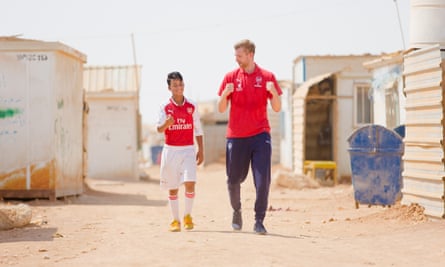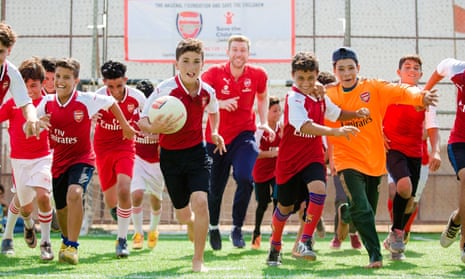As a footballer who used to be assailed by anxiety before matches, Per Mertesacker felt the butterflies rising as he made his approach to a pitch with a difference. He spent much of the hour-long drive from Amman, the capital of Jordan, to Zaatari, one of the largest refugee camps on earth, wondering what to expect. Mertesacker is a deep thinker and his mind whirred. “It gives you the goose bumps,” he says. “You are a little bit depressed to go there. You have respect and know it is important for everything to sink in. When you arrive it’s tight, very hot and very dry. And then you go to a football pitch and see actual joy.” The collision of that joy with the hardship and trauma around it strikes him profoundly.
In his new role as head of Arsenal’s academy, Mertesacker spends most of his days in the world occupied by boys with their heads full of the challenges involved in becoming a professional footballer. Away from the bubble, the former centre‑back, who made 156 appearance for Arsenal, meets thousands more in everyday life who share that dream even though they will never get anywhere closer than in their imagination.
Mertesacker is comfortable talking to boys and their families about the realities of a life in football but sitting in the temporary home of Mohammad, a displaced Syrian, taking tea with his family and enjoying hospitality as the boy outlined his ambitions with such conviction, Mertesacker was hit by the paradox: here was Mohammad, in conditions that make a professional career seem almost impossible, with his pure love for the game intact.
Back in England, players in elite academies with refined facilities and financial rewards find their natural instincts get dulled along the way. “Mohammad explained: ‘Football is my life,’ with tears in his eyes,” Mertesacker says earnestly. “It is his dream to be like me, and he really believes it. Speaking to him was very emotional because you can feel he didn’t want to talk about what happened and how they ended up there. They want to talk about what they have now – a corrugated iron structure made into a home, their own little garden, a chance to get an education, football in their lives. They were actually counting what they have, not what they left.”

During his time in Zaatari, Mertesacker began to appreciate how the football pitch there, built by Arsenal in conjunction with Save the Children, is a trigger for the much deeper work that goes on around this patch of artificial turf. He understands it could feel tokenistic, or even incongruous. But the key to it all is that giving children who have fled a war zone a space to kick a ball around and feel joy is only part of what they do.
The mission here is about developing resilience, feeling part of a group. There is also a focus on training the coaches to detect signs of stress in young people, to identify a change in behaviour and get suitable support for them, whether they are depressed or undernourished or uncommunicative.
All in all, it was a particularly meaningful experience for Mertesacker as he begins a new phase of his life. “You spend some time with kids, you always take something with you,” says the 33-year-old. “Here we are developing youngsters in an environment where they feel they have almost everything. There are still so many issues around young players, and we need to find the right way for them. What is really important? What does he need for his self-belief? For his development? That reminder was basic. Youngsters need self-esteem, simple targets in life which give energy. In the academy they can be so easily distracted by so many other things it’s amazing.
“We are getting rid of so many natural instincts that youngsters have. There are so many people around young kids nowadays it can make it very tough and difficult – people who think they are going to care for those kids but do the opposite. As long as the money comes in as it does at the moment, we don’t understand what impact money has on kids and parents in football. That is a huge topic in football.”
Is it a losing battle in the modern world? “I am for honesty and trying to explain things, taking parents on board. You can’t turn back the clock. Twenty years ago I wasn’t paid until I was 18 and that really helped me in my development. My parents did not go mad. I had no agent. I had no shoe deal. There is a part of me that would like to do it how it was but that’s impossible. We have to try to bring a little bit more reality and normality. If you just get given things along your way, you don’t have joy any more. You lose that joy, that appreciation for what you can do, and what privilege you have. I don’t want them to lose their personality. Locking them in our facilities, where they just have the tunnel vision of just performing on the pitch? I get that. We judge them on their football. But you lose a lot of personality and then you are not able to perform at any level.”
With luxury training centres, top coaching and total organisation, Mertesacker feels we are missing something much more vital about the human behind the footballer. “Do we misunderstand what care means? That is the key question for me,” he says. “If we throw money at them and give them everything they need, build beautiful facilities, is that really care which helps them for the future? That is my question as I step into the academy. Because not everyone will be a professional footballer. This is obvious. The ratios are quite shocking. The more leaders we have that bring more reality into that life in the bubble – when this bubble gets burst not everyone can cope with society – the better. This is a topic I will always attack and be very honest about.”
Mertesacker is throwing himself and his ideas into his new role. It is his first season outside of the players’ zone for a long time, a seismic personal change. Many are daunted by that shift. He isn’t. “That moment when I felt I don’t need to start running was the best feeling I have had for years,” he says, candidly. “It gave me relief. I don’t miss anything now. I am grateful for the experience but 15 years was intense enough for me. I have closed that chapter. This new one is so exciting right now. As a player you are in a tunnel. Now the understanding has to be much broader.
“I want to find out more, to build something here so that we have youngsters who can cope with any challenge in life. Talent is not enough for me. I want strong young characters who can cope if they get injured, or released, or play at the Emirates in the first team. That is our responsibility.”
